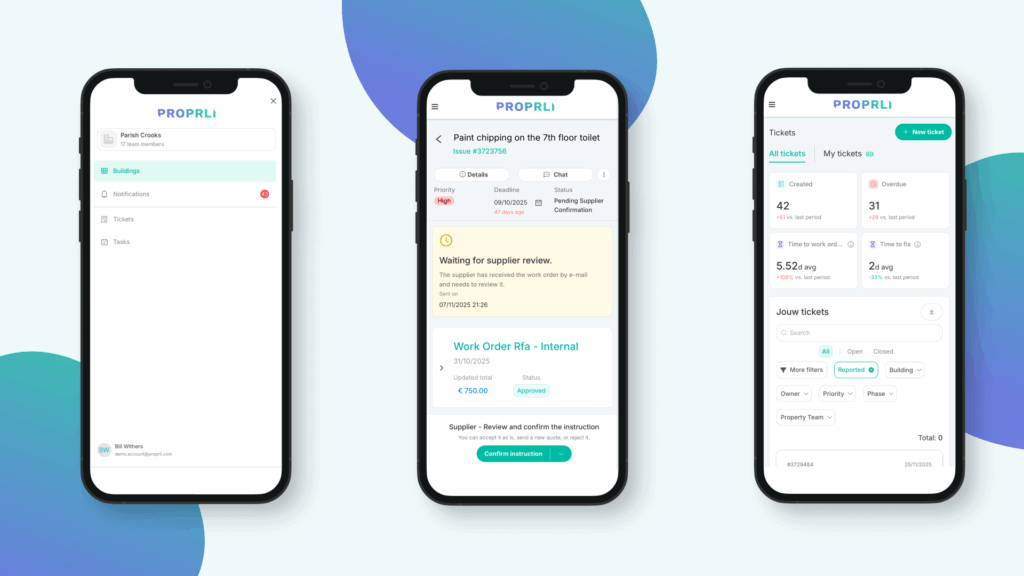The real estate industry is experiencing a significant digital transformation. Cutting-edge technologies are changing how properties are bought, sold, and managed. Innovations like virtual reality tours and smart home technology are reshaping the landscape. This tech revolution enhances efficiency and convenience for both buyers and sellers. It also empowers real estate professionals with tools to streamline operations and deliver outstanding client experiences.
PropTech innovations have introduced new possibilities to the real estate sector. Online property listings have become the standard, allowing buyers to explore properties from home. Advanced search filters and interactive maps simplify finding the perfect property. Virtual reality tours have also changed property viewing, enabling buyers to explore homes virtually without physical presence.
Digital transformation benefits real estate professionals as well. Agents can use data insights to make informed decisions and tailor marketing strategies. Property managers can use automation and IoT devices to monitor and control properties remotely. This ensures optimal performance and tenant satisfaction.
Key Takeaways
- Digital transformation is revolutionizing the real estate industry, making the process more efficient and convenient for buyers and sellers.
- PropTech innovations, such as virtual reality tours and smart home technology, are reshaping the way properties are showcased and experienced.
- Online property listings have become the norm, allowing buyers to explore a wide range of properties from the comfort of their homes.
- Real estate professionals can leverage data-driven insights and automation to work smarter and provide personalized recommendations to clients.
- Property managers can harness IoT devices to remotely monitor and control various aspects of a property, ensuring optimal performance and tenant satisfaction.
The Changing Landscape of Real Estate
The real estate industry has seen a significant transformation, driven by digital technologies and PropTech. This shift has made the industry more efficient, data-driven, and focused on the user. Digital real estate investing platforms have revolutionized the way investors access opportunities and manage their investments.
The industry’s move towards digitalization is a major change. Online platforms and tools have made it easier for everyone involved in real estate to access information and services. Now, buying, selling, and managing properties is more convenient and accessible than ever.
Data and analytics have become crucial in the real estate world. Advanced software solutions help professionals gather and analyze vast amounts of data. This data-driven approach enables them to make better decisions, find new opportunities, and optimize their operations for success.
PropTech has also significantly impacted the industry. It refers to the use of technology to enhance property transactions. From smart homes to blockchain transactions, PropTech is changing the real estate landscape. As more companies adopt these technologies, we can expect even more changes in the future.
- Increased efficiency and transparency in real estate transactions
- Greater access to data and analytics for informed decision-making
- Improved user experience through digital tools and platforms
- New opportunities for investors and property owners alike
Technology will continue to shape the real estate industry’s future. Those who embrace this digital transformation will thrive, while those who resist may fall behind. The evolving real estate landscape offers both challenges and opportunities. It’s up to industry professionals to navigate this dynamic environment with skill and innovation.
Historical Evolution of Real Estate Technology
The real estate industry has seen a significant transformation over the last few decades, driven by technological progress. This journey began with physical property listings and evolved into the current era of virtual tours and blockchain transactions. This evolution is truly revolutionary.
In the 1990s, the internet started to change the real estate scene. Online property listings became available. These platforms provided a centralized database of properties, making it easier for buyers and renters to find homes. As internet access grew, so did the popularity of these sites, paving the way for further technological advancements.
The 2000s saw the introduction of more advanced tools. These included advanced search functions, virtual tours, and mobile apps. These tools made property information more accessible, allowing people to explore properties remotely. Virtual tours, in particular, changed how people viewed properties, offering immersive experiences similar to in-person visits.
The 2010s brought data analytics and artificial intelligence to the forefront. These technologies helped real estate professionals make better decisions by analyzing large datasets. They identified trends, predicted market changes, and optimized pricing. Blockchain and smart contracts also entered the scene, enhancing transaction security and transparency, and streamlining processes.
As technology advanced, virtual and augmented reality began to transform property viewing. These technologies offered even more immersive and interactive ways to explore properties remotely. The term “PropTech” emerged, covering a wide range of technologies in the real estate industry, from property management software to investment platforms.
Today, the real estate industry is embracing new technologies, with artificial intelligence, IoT, and automation becoming key players. These technologies are being used to streamline transactions, improve property management, and enhance the user experience. Looking ahead, it’s clear that technology will continue to shape and redefine the real estate industry.
Real Estate Software Development: Tailoring Solutions
In the fast-paced world of real estate, software development is key to improving operations and user experiences. It involves creating apps and platforms tailored for property professionals like agents, brokers, and managers. These solutions cover a broad spectrum, from property management systems and online listing platforms to transaction management tools and CRM software.
Property management systems simplify managing real estate properties. They offer features like tenant screening, lease management, maintenance tracking, and financial reporting. These systems automate tasks and centralize data, helping professionals work more efficiently.
Online listing platforms have changed how properties are marketed and found. They provide an easy-to-use interface for showcasing properties with detailed descriptions, images, and virtual tours. Developers focus on optimizing these platforms for search engines, making properties easier to discover.
Transaction management tools are crucial in real estate software development. They streamline transaction processes, from contract generation and e-signatures to document storage and compliance management. This digitization and automation save time, reduce errors, and enhance client experiences.
CRM software is a game-changer for real estate professionals aiming to improve client relationships. CRM systems track leads, automate follow-ups, and personalize communication. By leveraging data and automation, CRM software helps build stronger client connections, leading to increased sales and loyalty.
The aim of real estate software development is to enhance efficiency, streamline processes, and improve user experiences. By incorporating features like property search, virtual tours, document management, and data analytics, these solutions contribute to a more advanced real estate ecosystem. As the industry evolves, software developers will be crucial in shaping property transactions and management’s future.
Customizing Software for Real Estate
The real estate industry is complex and diverse, needing tailored software solutions. Customized real estate software is key for streamlining operations and improving data management. It enhances communication among stakeholders. By adapting software to real estate professionals’ needs, businesses can optimize workflows and increase productivity.
Real estate management software is crucial in this field. It’s designed to help property owners and managers efficiently handle tasks like tracking leases and managing tenant information. Centralizing data and automating routine processes reduces the administrative burden. This allows professionals to focus on strategic tasks.
Customized software also plays a vital role in enhancing the customer experience. Virtual tour software is a powerful tool for creating immersive, interactive property tours. It provides potential buyers with a realistic, 360-degree view of a property. This can generate more interest and lead to faster sales.
| Software Type | Key Benefits |
|---|---|
| Real Estate Management Software |
|
| Virtual Tour Software |
|
Customizing software for the real estate industry is not just about improving internal processes. It’s also about staying competitive in a digital marketplace. As more buyers and sellers use online platforms, businesses with tailored software solutions will meet evolving client needs. They will maintain a strong market presence.
Streamlining Property Management with Software
In today’s fast-paced real estate world, efficient property management is crucial for success. Property management software has transformed property management, offering features that streamline operations and boost efficiency. These digital tools handle everything from maintenance scheduling to tenant communication, essential for property managers aiming to optimize their workflows.
One major advantage of property management software is its ability to automate maintenance scheduling. With user-friendly interfaces and advanced scheduling tools, managers can track and manage maintenance tasks efficiently. This ensures properties are well-maintained and tenants are happy. It saves time and prevents overlooking critical maintenance issues that could lead to expensive repairs.
Effective tenant communication is another area where property management software shines. It provides a centralized platform for communication, allowing managers to quickly connect with tenants, address concerns, and share updates. Features like online portals, messaging systems, and automated notifications keep tenants informed and engaged. This fosters positive relationships and reduces the chance of disputes.
| Feature | Benefit |
|---|---|
| Automated Maintenance Scheduling | Ensures timely completion of maintenance tasks and prevents costly repairs |
| Centralized Tenant Communication | Facilitates quick and effective communication, improving tenant satisfaction |
| Online Rent Payment and Tracking | Simplifies the rent collection process and provides real-time financial insights |
| Document Management and Storage | Securely stores and organizes important documents, reducing paperwork and improving efficiency |
Property management software also includes features like online rent payment and tracking, document management, and financial reporting. These tools offer a comprehensive solution for managing properties, from daily operations to long-term financial planning.
The real estate industry’s evolution makes property management software increasingly vital for staying competitive. By using these digital tools, property managers can streamline their operations, increase efficiency, and achieve success in the dynamic real estate world.
Enhancing Customer Experiences through Digital Tools
In today’s digital world, customer experiences are key to success in real estate. New digital tools have changed how agents connect with clients. They make communication smoother, property searches easier, and overall engagement better. These tools are making the industry better, helping agents give top-notch service and build strong client relationships.
CRM tools have been a big change for real estate pros. They offer a place to manage client interactions, track leads, and keep communication organized. With CRM, agents can nurture relationships, answer questions quickly, and meet each client’s specific needs. This personal approach makes clients feel valued and helps agents become trusted advisors.
Property search websites and apps have also changed the game. They make it easy for clients to find homes that fit their wants, and agents can show their listings to more people. These tools make searching for properties easier and more effective for everyone.
Virtual tour platforms have elevated the real estate experience. They let agents create detailed, immersive tours that grab potential buyers’ attention, agents can make stunning 3D tours. This lets clients explore properties from home, making decisions easier. Virtual tours help agents reach more people, attract better leads, and improve the customer experience.
| Digital Tool | Key Benefits |
|---|---|
| CRM Tools | Seamless client interaction management, lead tracking, and organized communication |
| Property Search Websites and Apps | Access to extensive property listings, user-friendly interfaces, and efficient showcasing of listings |
| Virtual Tour Platforms | Immersive property experiences, lifelike representations, expanded reach, and attraction of qualified leads |
The real estate industry’s digital shift is more than just new tech. It’s about using these tools to make real connections and offer great customer experiences. By using CRM tools, property search sites, and virtual tours, agents can improve their work, marketing, and client service. As the industry grows, those who use digital tools well will succeed and build strong client relationships.
Virtual Tours and Property Visualization
Virtual tours and property visualization have transformed the real estate industry. They allow potential buyers to explore properties in detail without visiting. These technologies make viewing properties more convenient and engaging for everyone involved.
Augmented reality (AR) and virtual reality (VR) are key advancements. AR brings properties to life, enabling buyers to see them in new ways. Buyers can take virtual walkthroughs and explore digital staging options from their devices. This gives them a realistic view of the property’s layout and potential.
Virtual reality (VR) takes the experience further. Buyers can step into a 3D environment with a VR headset. They can walk through rooms and interact with virtual furnishings. This level of engagement helps buyers truly imagine themselves in the space.
Virtual tours offer many benefits. Properties with 3D home virtual tours are more likely to attract buyers. In fact, up to half of customers won’t consider listings without virtual tours. These experiences draw more attention and interest in properties.
Virtual tours also help sellers and agents. They save time and resources by reducing physical visits. This streamlines the selling process and allows agents to showcase properties globally. It increases the chance of finding the right buyer.
The real estate industry is embracing digital transformation. The use of virtual tours and immersive experiences is expected to grow. These technologies help professionals stand out, provide value, and drive the industry forward.
Data-Driven Insights Reshaping Real Estate
The real estate sector is undergoing a significant transformation, driven by the power of data and advanced analytics. Big data analytics, machine learning, and predictive analytics are revolutionizing decision-making in the industry. They offer unprecedented insights and opportunities for growth. By leveraging these technologies, stakeholders can gain a deeper understanding of the market, identify trends, and make informed decisions that drive success.
Big data analytics is crucial in the real estate industry, enabling the collection and analysis of vast amounts of information from various sources. It empowers real estate professionals to uncover valuable insights about market trends, consumer behavior, and property performance. This knowledge allows them to make data-driven decisions, optimize their strategies, and stay ahead of the competition.
Machine learning algorithms are transforming property valuation and risk assessment in the real estate industry. By training models on historical data and market trends, machine learning can accurately predict property values, rental yields, and potential risks. This technology enables investors and lenders to make more informed decisions, minimizing risks and maximizing returns.
Predictive analytics takes data-driven insights to the next level, allowing real estate professionals to anticipate future trends and market dynamics. By analyzing patterns and correlations in vast datasets, predictive analytics models can forecast demand, price fluctuations, and investment opportunities. This foresight empowers stakeholders to make proactive decisions, capitalize on emerging trends, and mitigate potential risks.
| Technology | Key Benefits |
|---|---|
| Big Data Analytics | Uncovers valuable insights, identifies trends, and optimizes strategies |
| Machine Learning | Accurate property valuation, risk assessment, and informed decision-making |
| Predictive Analytics | Anticipates future trends, forecasts demand, and identifies investment opportunities |
The integration of data-driven insights is transforming the real estate landscape, enabling professionals to make smarter, more informed decisions. By embracing big data analytics, machine learning, and predictive analytics, the industry is poised for unprecedented growth and innovation. As technology continues to advance, the future of real estate lies in the ability to harness the power of data and leverage it for strategic advantage.
Real Estate Investment and Financial Tools
In the complex realm of real estate investment, making informed decisions requires a careful analysis of data, market trends, and financial feasibility. The rise of technology has revolutionized this process. Real Estate Investment Management Platforms, Financial Data and Analytics Tools, Financial Modeling Software, and ROI Calculation Software play a crucial role. They empower investors to make strategic choices.
Investment analysis and management in real estate have been transformed by innovative software solutions. These tools are essential for sound financial decision-making. They provide investors with the insights needed to assess potential investments and optimize their portfolios. Real Estate Investment Management Platforms offer a comprehensive suite of features. These include property valuation, financial reporting, and portfolio analysis, enabling investors to make data-driven decisions.
On the stock market side, Financial Data and Analytics Tools provide real-time market information, financial news, and advanced analytics. They empower investment professionals to stay ahead of the curve. These tools offer a wealth of data and insights. They allow investors to identify trends, assess risks, and seize opportunities in the fast-paced world of real estate investment.
Financial Modeling Software and ROI Calculation Software are also critical components of the real estate investment toolkit. They enable investors to create detailed financial models, forecast cash flows, and calculate key metrics such as net present value (NPV) and internal rate of return (IRR). By leveraging these software solutions, investors can assess the financial viability of real estate ventures with greater accuracy and confidence.
| Tool | Key Features | Benefits |
|---|---|---|
| Real Estate Investment Management Platforms | Property valuation, financial reporting, portfolio analysis | Enables data-driven decision-making and portfolio optimization |
| Financial Data and Analytics Tools | Real-time market information, financial news, advanced analytics | Empowers investors to stay informed and identify opportunities |
| Financial Modeling Software | Detailed financial modeling, cash flow forecasting, key metric calculation | Facilitates accurate assessment of investment viability |
| ROI Calculation Software | Return on investment analysis, scenario testing, risk assessment | Helps investors make informed decisions and maximize returns |
The integration of these powerful Real Estate Investment and Financial Tools has revolutionized the way investors approach real estate. By harnessing the power of data, analytics, and financial modeling, investors can make more informed decisions. They can minimize risks and maximize returns in an increasingly competitive market.
Real Estate Digital Transformation: Driving Industry Evolution
The real estate tech revolution is transforming the industry at an unprecedented pace. It’s reshaping how properties are bought, sold, and managed. Software development has become a key driver of innovation. It enables real estate professionals to streamline processes, enhance customer experiences, and make data-driven decisions.
Custom software solutions tailored to real estate businesses are becoming more prevalent. They empower property managers to optimize operations and deliver exceptional service. By leveraging cutting-edge technology, real estate firms can automate tasks, improve communication, and gain insights into market trends and customer preferences.
The impact of digital transformation extends far beyond property management. It influences every aspect of the real estate industry. Virtual tours and immersive property visualization tools have revolutionized property exploration. They enable potential buyers and renters to experience spaces remotely and make informed decisions.
This technology has not only enhanced convenience but also expanded the reach of real estate listings. It attracts a wider pool of prospective clients.
The real estate tech revolution has also given rise to sophisticated data analytics tools. These tools provide invaluable insights into market dynamics, customer behavior, and investment opportunities. By harnessing the power of big data and machine learning algorithms, real estate professionals can make more accurate predictions, optimize pricing strategies, and identify lucrative investment prospects.
As the real estate industry continues to evolve, embracing innovation and adapting to emerging technologies will be crucial for success. Real estate businesses that invest in software development and digital transformation initiatives will be well-positioned to stay ahead of the curve. They will improve operational efficiency and deliver exceptional value to their clients.
The real estate tech revolution is not just a passing trend; it represents a fundamental shift in the industry’s operation. As we look to the future, it is clear that software development will continue to play a pivotal role. It will shape the real estate landscape, drive innovation, and unlock new opportunities for growth and success.
Emerging Technologies and Trends in Real Estate
The real estate sector is undergoing a significant shift, driven by new technologies. These innovations are changing how properties are bought, sold, and managed. They promise to bring more efficiency, transparency, and better user experiences.
Blockchain technology is making a big impact in real estate. Its decentralized and secure nature can enhance transaction transparency and security. Smart contracts and immutable ledgers make property ownership transfers smoother, cutting out intermediaries and fraud risks.
Artificial intelligence (AI) is also transforming the real estate industry. AI algorithms and predictive analytics are improving market forecasting and decision-making. They analyze vast data sets, offering insights that help professionals make informed decisions and optimize strategies.
Virtual and augmented reality (VR/AR) are changing property showcases. Immersive virtual tours let people explore properties remotely, offering a realistic experience. AR technologies add digital information to physical spaces, helping buyers visualize renovations or decorations in real-time.
Smart home technologies are becoming common in real estate. They offer better property management and energy efficiency. IoT devices like smart thermostats and security cameras can be controlled remotely. They save energy and reduce costs for owners and tenants.
The Internet of Things (IoT) is crucial in connecting properties to smart devices. IoT sensors and networks provide real-time data on property performance and maintenance needs. This data helps in proactive management, optimizing operations and reducing costs.
As these technologies and trends evolve, the real estate industry will continue to transform. Professionals who embrace these changes will thrive in the digital era. They will deliver more value and experiences to their clients.
Preparing for Ongoing Industry Transformation
The real estate industry is constantly evolving, and businesses must adapt and innovate to stay ahead. Embracing digital transformation is now a must for those aiming to thrive. By keeping up with emerging technologies and investing in flexible systems, companies can be ready for the future.
Creating a culture of continuous learning is crucial for real estate professionals. Encouraging employees to learn new skills and stay current with the latest tools is key. Collaboration with team members and industry partners also opens up new opportunities for growth.
To prepare for the ongoing transformation, real estate businesses should consider several strategies:
- Regularly assess and update technology infrastructure to ensure it remains adaptable and scalable
- Encourage innovation by creating a supportive environment for experimentation and idea-sharing
- Invest in continuous learning opportunities for employees, such as training programs and workshops
- Embrace digital transformation by integrating new technologies into existing processes and workflows
- Foster collaboration with industry partners, clients, and stakeholders to gain valuable insights and identify new opportunities
By focusing on these areas, real estate organizations can successfully navigate the ongoing transformation. Adaptability, innovation, and a commitment to continuous learning are essential for long-term success in the dynamic real estate landscape.
Conclusion
The real estate tech revolution, driven by innovative software, is transforming the industry. Technology’s rapid advancement is reshaping real estate. It’s now about streamlining management and improving customer experiences with virtual tours.
Looking ahead, embracing new technologies is key for success. Real estate professionals can make better decisions and deliver more value with data and advanced tools. The digital era in real estate is here, and those who adapt will thrive.
The real estate tech revolution is more than a trend; it’s a fundamental shift. Software development is continually expanding what’s possible. For property managers, investors, and buyers, embracing digital transformation is crucial for staying competitive and achieving success.
FAQ
How is technology transforming the real estate industry?
Technology is deeply integrated within real estate, driving innovation and success. Cutting-edge digital technologies and tools are revolutionizing the real estate experience, from buyers to brokers. Digital transformation introduces new tools like artificial intelligence and automation to redefine how real estate firms operate and serve customers, as well as how agents, sellers, and buyers interact.
What are some examples of real estate software solutions?
Real estate software development involves creating specialized applications and platforms tailored to the unique needs of the real estate industry. These software solutions range from property management systems and online listing platforms to transaction management tools and customer relationship management (CRM) software.
Why is customizing software important for the real estate industry?
Real estate is a diverse industry with unique challenges, necessitating customized solutions. Customizing software for real estate is vital due to the industry’s specific complexities. Tailored solutions optimize workflows, improve data management, and enhance communication, ensuring that real estate professionals can efficiently manage tasks like property listings and transactions.
How has software development improved property management?
Software development has facilitated streamlined property management operations, optimizing tasks and improving overall efficiency. Technology has revolutionized the way properties are managed, from maintenance scheduling to tenant communication. Property management software offers specific features and advantages that tackle these aspects effectively.
What digital tools are available for real estate agents and clients?
CRM tools help agents manage client interactions, track leads, and organize communication, fostering better relationships. Websites and apps enable agents and clients to access a wide range of property listings, enhancing the property search process. Virtual tour platforms allow agents to create immersive property experiences for online viewing.
How are virtual tours and property visualization changing the real estate industry?
Virtual tours and property visualization have redefined the way properties are showcased. Innovative use of software creates immersive virtual experiences for potential buyers. Technologies like augmented reality (AR) and virtual reality (VR) allow buyers to visit properties in 3D without physically being present, saving time and money for both buyers and sellers.
What role does data play in the real estate industry?
Data has become a cornerstone of informed decision-making in real estate. Software development has enabled the collection, analysis, and utilization of data to provide valuable insights for stakeholders. Predictive analytics is shaping the future of real estate, with software-driven models assisting in forecasting trends and making strategic decisions.
How do real estate investment and financial tools impact the industry?
Real Estate Investment and Financial Tools play a pivotal role in empowering investors to make informed and strategic choices. Investment analysis and management software provide tools for property valuation, financial reporting, and portfolio analysis. Financial modeling and ROI calculation software empower investors to assess the financial viability of real estate ventures with greater accuracy.
What emerging technologies are transforming the real estate landscape?
Blockchain technology is gaining traction for its potential to enhance transparency and security in property transactions, while artificial intelligence is being utilized for predictive analytics, improving market forecasting and decision-making. Virtual and augmented reality are transforming property showcasing through immersive experiences, and smart home technologies are becoming integral for enhanced property management and energy efficiency.
How can businesses prepare for ongoing industry transformation in real estate?
Businesses must prioritize adaptability and innovation to stay ahead in the evolving real estate landscape. Staying informed about emerging technologies, fostering a culture of continuous learning, and investing in flexible, scalable systems are essential. Embracing digital transformation and proactively exploring how new technologies can enhance operational efficiency will position organizations to thrive in the ever-changing industry.






